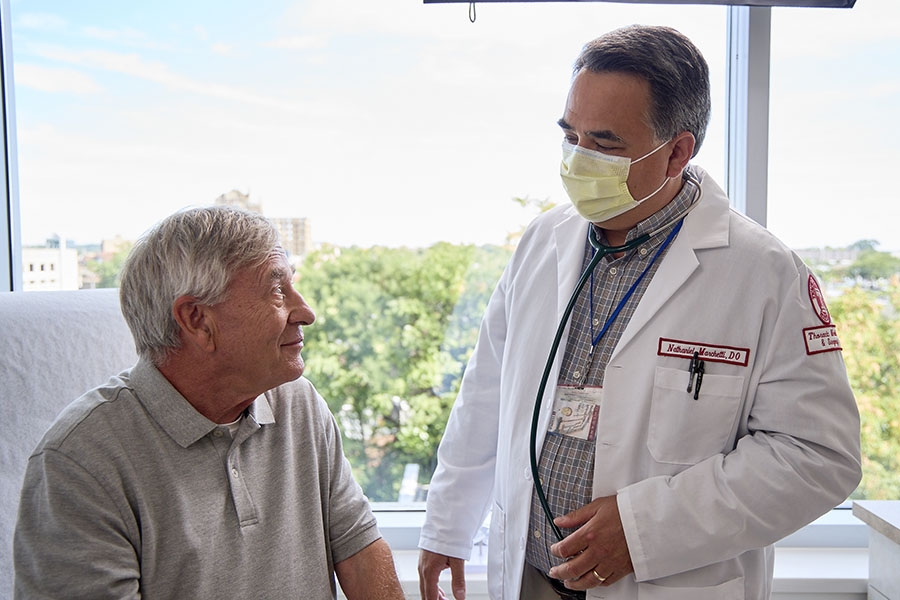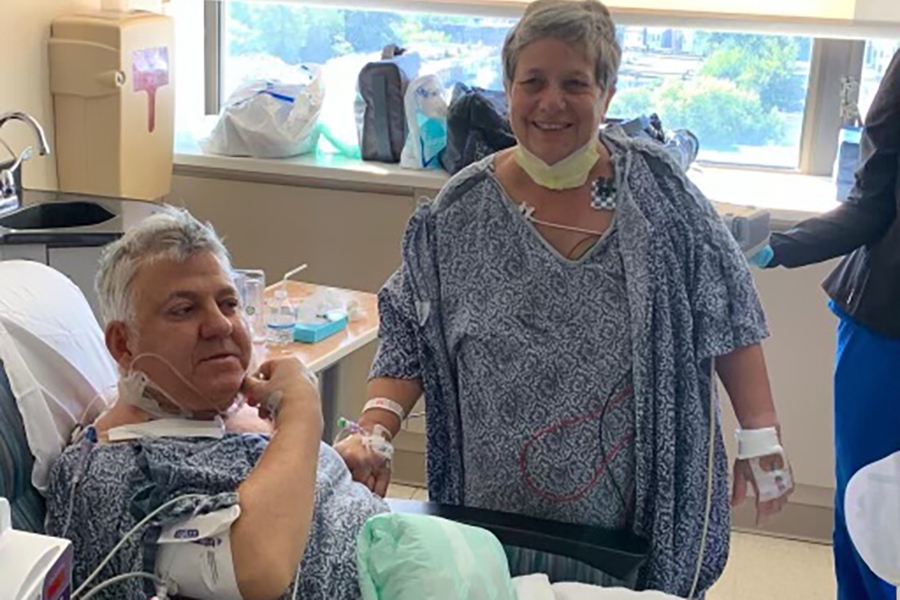Temple’s Kidney Transplant Program success rates are high, with 1-year survival meeting or exceeding the national rate. That’s largely due to our comprehensive post-recovery process in which our patients are closely monitored and supported in the weeks and months following a kidney transplant.
Most kidney transplant recipients can expect to return to work or normal activities within 6 to 8 weeks after their kidney transplantation surgery.
Before you leave the hospital, you will receive instructions on how to care for your new organ. This includes information on:
- Your medicines
- Nutrition and exercise
- Signs to watch out for infection or rejection
- When you might need to contact your transplant team
You will also be scheduled for a series of follow-up appointments and tests to see if you’re healthy and free of complications during your recovery.
Guidelines for Kidney Transplant Care
The following guidelines will help keep your new kidney as healthy as possible:
- Take your medicines as prescribed
- Keep your regular appointment schedule with the transplant team
- Wash your hands regularly and encourage others to wash their hands
- Avoid sun exposure and wear sunscreen with SPF 30 or above
- Avoid exposure to pet feces and do not allow your pets to lick you
- Be mindful of large crowds and limit your exposure to germs if possible
- Ease into activity and follow your transplant team’s instructions
Post-Procedure Recovery
You’ll usually stay in the hospital for 3-5 days before being discharged home. During your stay, your transplant team will monitor you closely for signs of complications, such as infection and organ rejection. You may have medical tests to check that your kidney and liver function. From medical tests, adjustments can be made to your medication.
Your new kidney may start to function immediately, or it may take a few days. You may need to be on temporary dialysis until your kidneys are properly functioning.
Everyone recovers at their own pace. Your team will plan your discharge based on the type of kidney transplant you had and your health during recovery. Before going home, your team will want to be sure you can manage on your own or with assistance at home.
The First Post-Transplant Appointment
Your first appointment with the transplant team after you leave the hospital is the most important. During this visit, your transplant nurse and transplant surgeon will monitor how well your body is adjusting to your new kidney. They do this by asking you a series of questions to see how you’ve been feeling since your kidney transplant, doing a general assessment to evaluate your health, taking your vitals and reviewing your lab results.
You will visit the lab just prior to your first post-transplant appointment to get your blood drawn. Your blood will be tested to monitor your blood counts, liver and kidney function, electrolytes and medication levels. You may need to pause some medication before getting your blood drawn. Your doctor's office will give you specific instructions about this.
You should come to the visit prepared to talk to your transplant nurse and transplant surgeon about any questions or concerns you may have. This includes your blood pressure, any side effects you may be experiencing, signs of wound infection or other symptoms you may have.
Always remember to bring your medication with you to every visit. You may also have a caregiver with you to take notes so you can focus on the conversation between you and your doctor.
After your first appointment, how often you meet with your doctor depends on the time from transplant:
- For the first few months: 2-3 visits per week, slowly moving to once a week
- Month 5: every 2 weeks
- Months 6-9: monthly visits
- After 1 year: every 6 months
Tips for Recovering at Home
There’s no better place to recover than from the comfort of your own home. Take this time to relax and recover, and try not to push yourself too hard. It’s important to listen to your own body, and to call your transplant team with any questions or concerns you may have. Your care coordinator will go over the do’s and don’ts with you before discharge. These may include:
- Give adequate time for yourself to recover
- Avoid operating machinery, such as driving a car and lifting heavy objects until your doctor tells you it’s okay to do so
- Follow any diet and exercise guidelines from your transplant team
- Follow your incision care instructions and let your team know if you have any redness, draining or heat coming from your incision
- Avoid alcohol and tobacco, as these can cause infections
If you live alone, consider asking someone to stay with you until you feel stable enough to manage on your own.
Medication Prescribed
After you have a kidney transplant, you will take medicines called immunosuppressants to help prevent organ rejection. Your transplant team will determine which medicines are right for you. Before discharge, you’ll be given instructions on:
- Dosage — how much and how often to take your medicine
- How to take your medicines
- How to monitor for side effects
- When to call your doctor with concerns
Although immunosuppressants work to help prevent organ rejection, they also make it more difficult for your body to fight off infections. Because of this, you may also take antibiotics, have blood tests, and undergo screenings during your post-transplant doctor appointments.
Tools to Assist in Post-Transplant Care
Once you’re discharged home, you’ll need to monitor yourself for signs of infection or other problems. It’s helpful to have a few tools on hand, including:
- Thermometer – high temperature may indicate infection
- Blood pressure cuff – if your kidney is not functioning properly, you may develop high blood pressure
- Scale – unusual weight gain may signal fluid retention
- Medication organizer – it’s important to take your medicine as prescribed
Rejection Signs
One of the most common problems patients face after a kidney transplant is organ rejection. It’s important to watch for signs of rejection and contact your transplant team immediately if you have any of the following:
- Temperature over 100 degrees F
- Pain in the area of your kidney
- Nausea, vomiting or chills
- Swelling or sudden weight gain
- Less frequent urination
Your transplant team will conduct a series of tests to see if your body is rejecting your new kidney. Medications are available to help prevent rejection and reduce your chance of having further complications.
Recovery for Donors
If you’re a living kidney donor, you’ll typically stay in the hospital for 1-2 days after your surgery. You may have some pain in the area of your incision as it continues to heal, but this should continue to improve in the days after surgery. Be sure to follow your discharge instructions, including guidelines on lifting heavy objects.
The transplant team will schedule you for bloodwork and follow up in 1 week to 10 days after discharge. You will see the team again in 6 months, 1 year and 2 years. It’s important to keep your appointments and to contact your doctor immediately with any problems or concerns.
Donors can usually return to work and normal activities 3-4 weeks after surgery.
Kidney Donors and Pregnancy
Most living kidney donors have no problems during pregnancy, but about 12% of donors experience preeclampsia (high blood pressure) that occurs during pregnancy. Make sure you talk with your doctor before planning your pregnancy and try to avoid getting pregnant until you’re completely healed from your surgery. Your transplant team will advise you on when you may consider yourself healed.
When to Call the Transplant Team
In addition to watching for signs of organ rejection, be aware of other symptoms that may indicate a problem. Call your transplant team immediately if you notice the following:
- Bleeding
- Swelling or fluid retention
- Productive (wet) cough, especially if it lasts longer than a week
- Skin changes, including rash
- Unusual vaginal discharge or itching
- Nausea, vomiting or diarrhea
- Discolored stool or urine, or difficulty with urination
If you notice anything unusual, it’s always a good idea to reach out to your transplant team.
Ready for an Appointment?
Schedule an appointment with the Temple Kidney Transplant team or call 800-TEMPLE-MED (800-836-7536).

